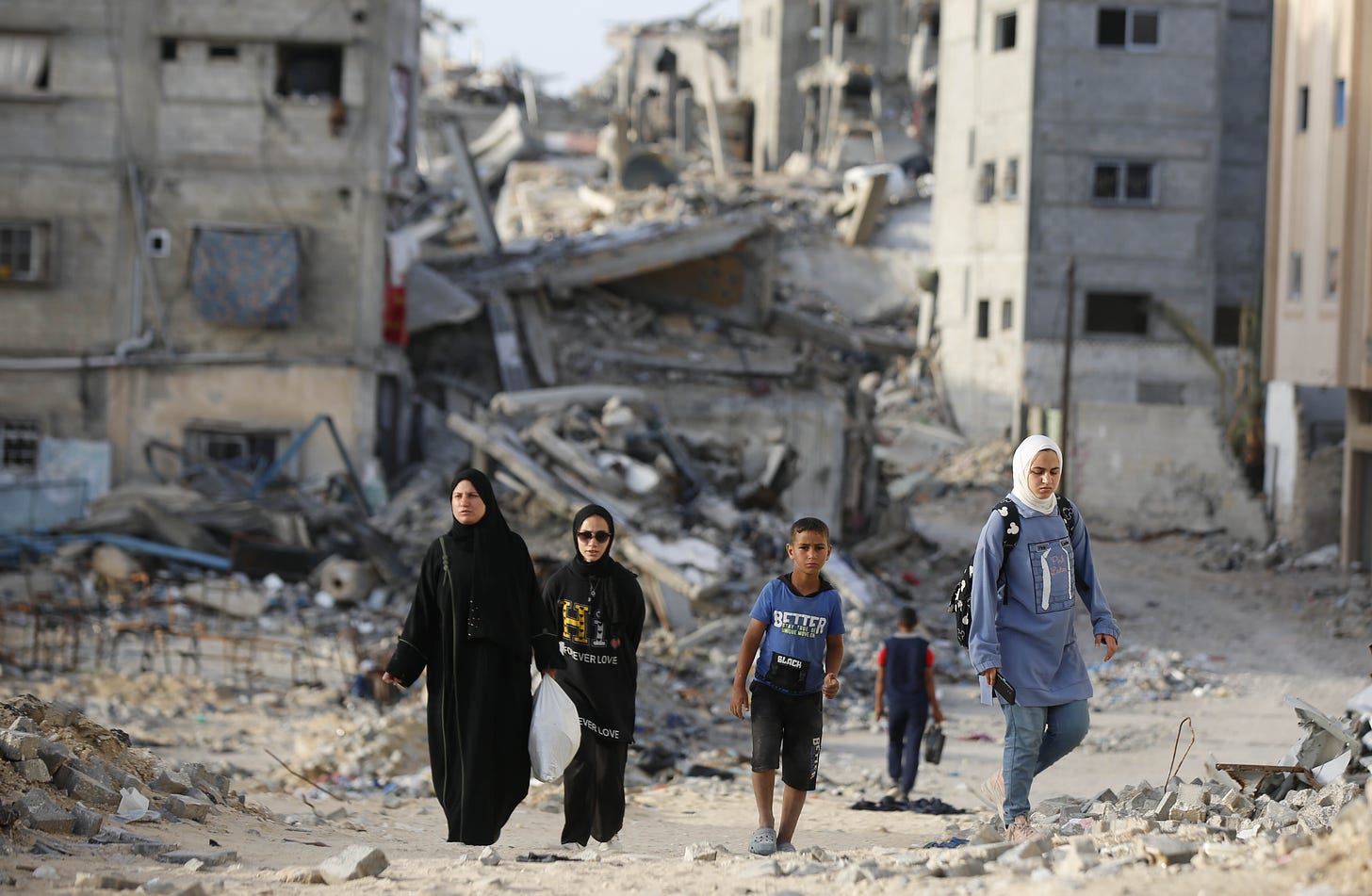Biden’s Big Dream for the Middle East
Could it be the spark needed to finally ignite a solution?
When writing a piece about Israel and its Middle East neighbors, it is hard to know where to begin. Do you start 76 years ago with the founding of the State of Israel after the atrocities of the Second World War? Do you go back further to explain historical antisemitism and the deep-seated antagonism between Arabs and Jews? How about documenting the various wars and the peace agreements Israel has taken part in over the past seven decades?
It is the most confounding and complicated story I have ever covered, and I have been covering it for as long as I have been a reporter.
For today’s purposes, I am going to start with the October 7 attack by Hamas on Israeli civilians. It was the deadliest terrorist attack in Israel’s history, killing 1,200 people, and the reason Israel, Gaza, and Hamas are now in the news. Hamas, the governing authority in the Palestinian territories, which includes Gaza, is a terrorist organization funded by Iran, according to the U.S. State Department. During the attack from Gaza, Hamas took more than 240 Israelis hostage. Approximately 100 are still being held, among them a handful of Americans. Israel has retaliated, killing an estimated 34,000 Palestinians and injuring at least 75,000. Not to mention the millions displaced from their homes in Gaza.
Why did Hamas attack seemingly out of the blue after years of, if not peace, then detente, in the Middle East? Perhaps because of a “grand diplomatic bargain” or “mega-deal” being negotiated among the United States, Saudi Arabia, and Israel — a deal that would include normalization of relations between Tel Aviv and Riyadh. Yes, the Biden administration had been quietly working on this deal for months, and Iran-backed Hamas reportedly wanted to blow it up. The ambitious agreement has far-reaching and game-changing implications. The impetus for getting these three players to the same table was their common enemy: Iran. One might think that Hamas succeeded in ending talks. Not so, according to Michael Crowley of The New York Times. “October 7th didn’t kill these talks. It actually made them bigger, more complicated, and some people would argue, more important than ever.”
The initial attack and Israel’s retaliation have had an immense geopolitical impact on many players in the region and across the globe, but none more so than the United States. The U.S. has strongly supported Israel since its inception. No other nation collectively receives more U.S. aid. Since October 7, President Biden’s support for Israel had not waivered, much to the consternation of college students around the country, among others.
For the past month, thousands of students at more than 130 colleges and universities in 45 states have been protesting what they see as the Biden administration’s pro-Israel policies. They have held rallies and sit-ins, some living in on-campus encampments, and are asking their school administrations for financial divestment from Israel. The students insist their actions are a reaction to the human rights abuses being documented in real time on social media, not fueled by antisemitism. In fact, the protesters include those from Jewish organizations.
Biden, who as we all know is in the middle of one of the most significant presidential campaigns in history, is in real danger of alienating a massively important demographic voting group: young people.
Yesterday, Biden did what would have once been unthinkable. He halted a planned shipment of bombs to Israel because Prime Minister Benjamin Netanyahu refuses to pull back from a planned invasion of Rafah, a city in southern Gaza. Rafah, which has seen its population swell by over a million refugees from other parts of Gaza displaced by this war, is Biden’s red line. Housing, food, and medicine are in worse than short supply. Israel has called for the evacuation of the city, but where are the 1.3 million people supposed to go? Rafah sits on the Egyptian border, just south of the Mediterranean Sea.
“We’re not walking away from Israel’s security,” Biden said. “We’re walking away from Israel’s ability to wage war in those areas.”
I am not saying Biden did this to placate the protesters, but I also can’t say it wasn’t part of his calculus. Also, Biden’s math includes finding the money to rebuild a decimated Gaza, which brings us back to the mega-deal. “Five leaders in the Arab community were prepared to help rebuild Gaza, prepared to help transition to a two-state solution,” Biden told CNN.
If Biden can hammer out an agreement with Saudi Arabia and Israel, it could be a diplomatic masterstroke that has many upsides: forging a pathway for Israel and the Palestinians to live as neighbors, improving Arab-Jewish relations in the region, reducing Iran’s power, perhaps appeasing voters at home, and finally bringing peace. The president is dreaming big. And in the Middle East, dreams die hard. Will this dream have a different ending?
We encourage you, the Steady community, to weigh in on this complex issue. What are you hearing? How are you speaking with your children and your friends about what is happening in Gaza?
If you value independent journalism that provides critical information to protect our democracy, please consider upgrading as a supporting member. It allows me to keep Steady sustainable and free for those who cannot afford it, especially in an election season when we need everyone to see it. Thank you.
No matter how you subscribe, I thank you for reading.
Stay Steady,
Dan




Narcissist Netanyahu finally being gone from power is a required step in any solutional direction.
Everyone—this is obviously a contentious issue and always has been. We appreciate your comments and while we encourage differing points of view, I ask that we be respectful of one another. Please, no name calling. Thank you.
—Dan